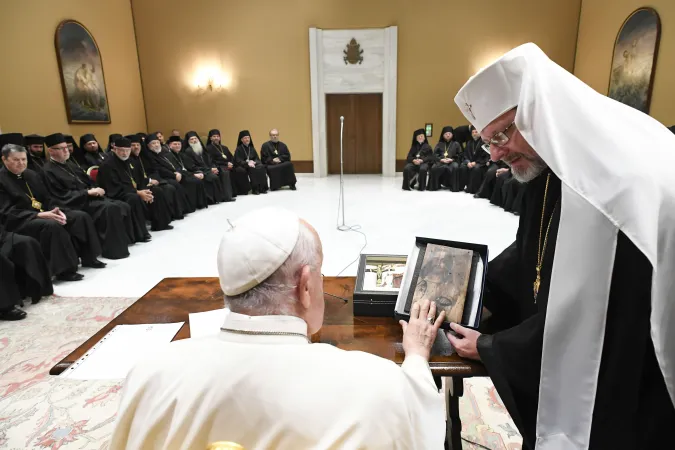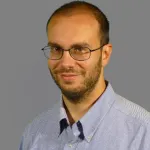
Pope Francis engaged in a substantive dialogue with the Synod of the Ukrainian Greek Catholic Church, spanning approximately one hour and forty minutes. During this meeting, the Pope not only clarified his perspective but also attentively listened to the testimonies of the bishops while recounting his multifaceted efforts to support Ukraine. This encounter had been highly anticipated, representing the initial opportunity for a direct exchange between the Pope and the Ukrainian Greek Catholic Church following his remarks about "Mother Russia" and the historical legacies of Peter I and Catherine II. These comments, delivered during a meeting with young Russians on August 25, had triggered various controversies, including a response from the Ukrainian Greek Catholic Church, which raised concerns that the Pope might be endorsing a Russian imperialistic viewpoint. However, the Apostolic Nunciature in Kyiv and the Vatican Press Office had come to the Pope's defense, emphasizing that he did not support any imperialistic ideologies.
Pope Francis had already provided clarification on his statements during his return from Mongolia, emphasizing that they should be interpreted as cultural references rather than political endorsements. The recent dialogue with the bishops of the Ukrainian Greek Catholic Church, who had convened in Rome for their synod, further facilitated the clarification of positions.
The meeting commenced an hour earlier than scheduled at Pope Francis's request. His Beatitude Sviatoslav Shevchuk, the head of the Ukrainian Greek Catholic Church, described the meeting as "an opportunity for candid and sincere dialogue" and "a time for mutual listening." At the bishops' request, the gathering commenced with a prayer for a just peace in Ukraine and for those who have perished "in our homeland at the hands of the Russian aggressor."
His Beatitude Shevchuk underscored that during the conversation, the Synod conveyed to the Pope the concerns and requests of the faithful in Ukraine and worldwide. The bishops communicated in Ukrainian, English, Portuguese, and Italian. Notably, they drew the Pope's attention to the challenges posed by "certain statements and actions of the Holy See and His Holiness," which they found challenging, particularly given Ukraine's ongoing struggle for dignity and independence.
The Synod members highlighted that misunderstandings between the Vatican and Ukraine have persisted "since the outset of the large-scale conflict." These misunderstandings, they noted, have been exploited by Russian propaganda to justify and bolster the destructive ideology of the Russian world. Consequently, they stressed the sensitivity of their Church's members to every word from the Pope, seen as a universal voice of truth and justice.
The dialogue also addressed Pope Francis's engagement with young Russians. The Pope reiterated the explanation he had offered upon returning from Mongolia, emphasizing that genuine distress arises when a people's cultural heritage is diluted and manipulated by state powers, ultimately transforming it into an ideology that causes destruction and death. He lamented the tragedy of this ideology infiltrating the Church and replacing the Gospel of Christ.
According to a statement from the Ukrainian Greek Catholic Church, Pope Francis "also acknowledged the pain felt by the Ukrainian people due to their doubts about him. He expressed his solidarity and assured them of his constant prayers, affirming his support for the Ukrainian people."
The Pope brought along the icon of Theotokos, the mother of God, presented to him by Archbishop Major Shevchuk during his time as an eparch in Argentina. Pope Francis mentioned that he prays for Ukraine daily before this icon.
The bishops expressed their gratitude to the Pope for his unwavering international support for Ukraine, his humanitarian initiatives, personal endeavors to secure the release of prisoners, and the peace mission led by Cardinal Matteo Zuppi. They recalled how the humility expressed by the Pope, coupled with his request for forgiveness for not doing more to end the conflict in Russia, deeply moved young Ukrainians.
Conversely, the Synod members appealed to the Pope to persist in his efforts to secure the release of prisoners of war. Specifically, they highlighted the cases of two Redemptorist priests, Father Ivan Levytskyi and Father Bohdan Haleta, who were detained and subsequently disappeared. These cases had also been mentioned by Cardinal Pietro Parolin in his report to the Synod on September 5.
The Pope was presented with personal items belonging to the two Redemptorist fathers, including a missionary cross, a prayer book, and a rosary. Archbishop Major Shevchuk conveyed that these items bore witness to the suffering endured by their Church alongside the Ukrainian people in the midst of the horrors of the war stemming from Russian aggression. As invaluable treasures, these items were offered with the hope of a just peace soon prevailing in Ukraine.
His Beatitude also gifted the Pope with an icon of Jesus Christ rescued from a church that had been burned by Russian forces in the village of Chervone, located in the Zaporizhia region.
This article was originally published on ACI Stampa.

Andrea Gagliarducci is an Italian journalist for Catholic News Agency and Vatican analyst for ACI Stampa. He is a contributor to the National Catholic Register.








